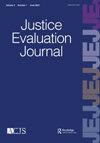Methodological Quality and Validity Issues in the Crime Prevention Literature
IF 0.7
Q3 CRIMINOLOGY & PENOLOGY
引用次数: 2
Abstract
Abstract This paper presents an assessment of the existing literature on validity and methodology relevant to crime prevention studies. Reports eligible for inclusion in the review focused on assessing the methodological quality of crime prevention evaluations. A narrative synthesis approach was used to review the included reports to examine how validity considerations are assessed and addressed in criminological impact evaluations. The reports reviewed included substantive discussions of the five types of validity, as well as discussions of interrelated issues of evaluation design, methodological quality scales, and evidence-based registries. We recommend that all crime prevention evaluations address the methodological issues discussed in this article. In addition, policymakers should consume research with a critical eye toward potential validity issues. Where valid evaluations show interventions to be promising, practitioners should make efforts to ensure fidelity in program implementation. Registries should support policymakers and practitioners in identifying and implementing evidence-based policy and programming through providing guidance on choosing interventions aligned to their priorities and settings, understanding the strengths and weaknesses of various strategies and programs and the conditions under which they are successful, and implementing programs and replicating evaluations with fidelity.预防犯罪文献中的方法质量和有效性问题
摘要本文对现有的有关犯罪预防研究的有效性和方法论文献进行了评估。有资格列入审查的报告侧重于评估预防犯罪评价的方法学质量。采用叙述综合方法审查纳入的报告,以检查在犯罪学影响评价中如何评估和处理有效性因素。审查的报告包括对五种效度类型的实质性讨论,以及对评价设计、方法学质量量表和循证登记等相关问题的讨论。我们建议所有预防犯罪的评估都处理本文中讨论的方法问题。此外,政策制定者应该以批判的眼光看待潜在的有效性问题。在有效的评估显示干预措施是有希望的地方,从业者应该努力确保计划实施的保真度。登记处应支持决策者和从业人员确定和实施基于证据的政策和规划,方法是提供指导,指导他们选择符合其优先事项和环境的干预措施,了解各种战略和规划的优缺点及其成功的条件,以及忠实地实施规划和复制评估。
本文章由计算机程序翻译,如有差异,请以英文原文为准。
求助全文
约1分钟内获得全文
求助全文

 求助内容:
求助内容: 应助结果提醒方式:
应助结果提醒方式:


